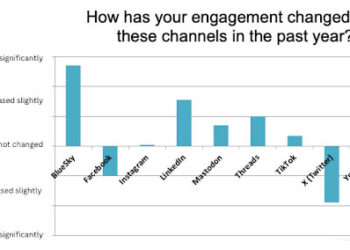
- Image via Wikipedia
Do publishers and information providers in the digital age suffer from “corporate asperger’s syndrome”? Yes, asperger’s syndrome, defined by Wikipedia as “significant difficulties in social interaction, along with restricted and repetitive patterns of behavior and interests.”
The notion of “corporate asperger’s syndrome” comes from one of the most fascinating interviews I’ve read in a long time, in which Rory Sutherland, an advertising executive in the UK, takes on a number of topics in a refreshing and frank manner.
Sutherland’s focus is on advertising and, more fundamentally, on the power of persuasion and social awareness. He’s genius at identifying counter-intuitive examples, scenarios where it’s clear we have our heads screwed on wrong, such as when . . .
. . . a man invents a brilliant new way for scanning x-rays — so you can do cancer scans and x-rays at one tenth of the previous cost and at twice the speed — and everybody heralds him as a hero. Then, it’s revealed that there isn’t any clever technology. All he does is scan the x-rays and then e-mail them off to the Philippines, where highly trained, low-cost employees do the actual scanning of the xX-rays manually, just as before, only at one-tenth of the salary. And the argument that’s used by economists is that people are absolutely scandalized by this, everyone thinks this is absolutely outrageous, and “What a terrible man!” Yet, bizarrely, the effects are identical. The effect of offshoring to a low-wage economy is the same as a technological innovation. Indistinguishable. You might even argue that the second course is better, at least if you’re a Filipino in need of a reasonably well-paid job. But, interestingly, we judge them morally on a very different level. We’re very subjective about that, and the means and the intentionality make a big difference.
The video below gives you a flavor of Sutherland’s style, and it’s both edifying and enjoyable. The bit toward the end about “Diamond Shreddies” will blow your mind.
[vodpod id=Groupvideo.4012941&w=450&h=325&fv=vu%3Dhttp%3A%2F%2Fvideo.ted.com%2Ftalks%2Fdynamic%2FRorySutherland_2009G-medium.flv%26su%3Dhttp%3A%2F%2Fimages.ted.com%2Fimages%2Fted%2Ftedindex%2Fembed-posters%2FRorySutherland-2009G.embed_thumbnail.jpg%26vw%3D432%26vh%3D240%26ap%3D0%26ti%3D658%26introDuration%3D16500%26adDuration%3D4000%26postAdDuration%3D2000%26adKeys%3Dtalk%3Drory_sutherland_life_lessons_from_an_ad_man%3Byear%3D2009%3Btheme%3Dthe_creative_spark%3Btheme%3Dnew_on_ted_com%3Btheme%3Dwhat_makes_us_happy%3Btheme%3Dmedia_that_matters%3Btheme%3Dspeaking_at_tedglobal2009%3Btheme%3Dunconventional_explanations%3Bevent%3DTEDGlobal%2B2009%3B]
Forgetting the human dimension, or thinking about it precisely backwards, is something we’ve become good at in our autistic state in which efficiency, low-cost, and time-savings are fixations. Sutherland gives examples of how engineers spent billions of dollars reducing the duration of London-Paris train transit, but instead could have spent a fraction making the ride more enjoyable (hiring fashion models to walk the aisles, installing wi-fi, or putting televisions in the seatbacks), perhaps so enjoyable passengers would have asked to slow the train down.
Enjoyment is an issue for Sutherland, who thinks we’ve lost the human aspects that make endeavors pleasurable. Depriving ourselves of such social juice leaves us unable to process information properly, so we focus on measures instead of meaning, process instead of purpose, and transactions instead of interactions.
This dullness has begun to define the employee-employer relationship, in which intangibles are dismissed or dropped (e.g., holiday parties), leaving only tangibles — salary, benefits, HVAC, and equipment:
Businesses have become more profitable and less sexy. Accountants have a stranglehold over everything. I don’t think being a pilot is as sexy as it used to be either. Life has become immeasurably better for the consumer, but for the employee has become worse. Your employer simply paying you well and nothing else is actually the beginning of a bad relationship. When a relationship is entirely transactional, it’s hard to form bonds of affection. It’s like being married to someone who only brings you flowers when they want sex.
Why bring this forward? What relevance does it have? To me, restoring the connection with our material is about making science, medicine, and technology socially relevant and interesting. If we don’t take into account the subtle but undeniable power of social persuasion, then science, technology, and medicine will be less effective, less relevant, and less desirable.
We need to channel the late Carl Sagan.
We have to design experiences that make sense, convey information, and make us more central to our users.
Are these experiences likely to emerge from print journals? From flat textbooks?
Are the typical initiatives — more digital, more multimedia, more information transactions — really moving us toward the goal? Or are they just more of the same?
Are our passengers likely to ask to stay on the train longer with the rides we’re offering?
Or are we having “significant difficulties in social interaction, along with restricted and repetitive patterns of behavior and interests”?
Do scholarly publishers, librarians, and others suffer from their own version of asperger’s syndrome?
(Thanks, AM, for the pointer. )
Discussion
2 Thoughts on "Can the Creativity of Social Persuasion Cure “Corporate Asperger’s Syndrome”?"
Sutherland is not the first to draw such comparisons. The documentary <The Corporation likened corporations to sociopaths, claiming they satisfy all necessary criteria – irresponsibility, anti-social tendencies, refusing to accept responsibility for actions, lack of remorse, etc.
In this case the argument against outsourcing to low-wage economies was that, far from providing badly needed “reasonably well-paid job[s]”, companies pay barely-living wages, stifle development, and capitalize on dire working conditions that would never be legal elsewhere…
![Reblog this post [with Zemanta]](http://img.zemanta.com/reblog_e.png?x-id=f07442ee-e52d-426c-b146-4d1601059b30)


